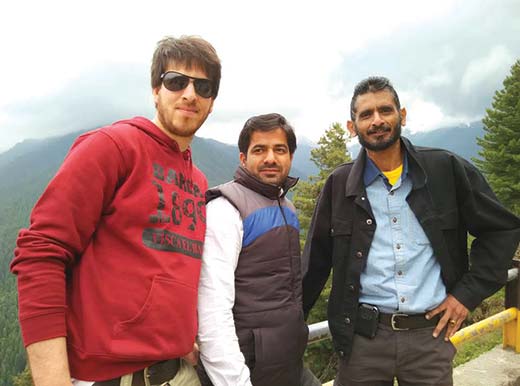RAJ RAO

There is a Kashmir phobia in people all over the world. When I decided to come to Kashmir for a holiday at the end of May, friends dissuaded me. “It isn’t safe,” they said. Some, with a penchant for humour, even told me that I might be taken hostage by militants. Others pointed out that since I was hassled by armed forces everywhere, possibly because of my appearance, gallivanting in Kashmir could compound my woes.
Ignoring the paranoia of friends, I finally got to Srinagar. I purposely took the train from New Delhi to Udhampur, partly because I am a train aficionado, but also because I wanted to check out the rugged hilly terrain that leads to Kashmir for myself. The journey from Udhampur to Srinagar in a Tavera car, a distance of some 237 kilometers, took me nine hours. And mind you, my driver was rash. He drove so fast on the narrow winding roads that more than once our Tavera almost fell off a cliff! There was heat and dust all around; dispelling the myth I had about the Jammu-Srinagar highway being one of the most idyllic roads in mainland India.
Then Kashmir came and I checked into my houseboat on the Dal Lake. The owner, a young man in his late twenties or early thirties, was the epitome of hospitality. We became friends soon, and over the next five days, he would tell me how business had suffered in Kashmir because of the political situation. “Our clients were mainly rich Western tourists,” he lamented, “but now you don’t see them anywhere. If the situation was normalized, we houseboat owners would own private jets by now, such is the turnover of our business.”
The sight of the police and the army on the streets was intimidating. Ordinary citizens seemed to be mere pawns in the game of chess between the military and militants, each trying to checkmate the other. “Militants can shut down a busy thoroughfare like Lal Chowk in five minutes flat,” a former student of mine who lives in Srinagar was telling me, “and the army can do nothing about it.”
My student wasn’t exaggerating. Mobile networks in Srinagar city suddenly went dead, and the rumour was that it was the handiwork of militants. An unheard-of outfit, Lashkar-e-Islami, was said to be behind the move. The owner of a land that housed a mobile tower was killed, I was told, and so was a salesman at a mobile store. But then, by evening, it was a different story altogether. Apparently, Syed Ali Geelani, Hurriyat leader, had clarified that it wasn’t militants who switched off our mobiles. The villains were the Indian intelligence forces! This was corroborated by Syed Salahudin, head of the UJC.
My dream of driving in sylvan surroundings came true when I borrowed my student’s car and zipped up to Gulmarg. Kashmir now conformed to the image I had of it, shaped by romantic Bollywood films like Junglee, Kashmir Ki Kali and Jab Jab Phool Khile. There was ground frost on the roads. There were tall pine trees everywhere. Birds sang. And I sang too. Taarif karu kya uski jisne tumhe banaya.
Yahoo!
The author, a noted writer and poet, and professor of English at the University of Pune, was in Srinagar on holiday, and delivered a guest lecture on late Aga Shahid Ali at Kashmir University.















